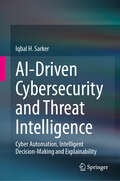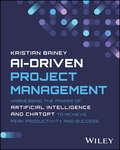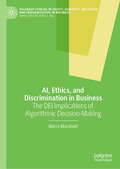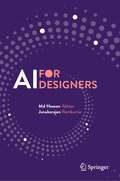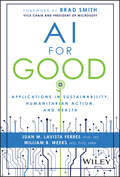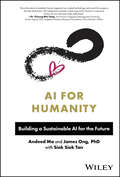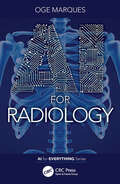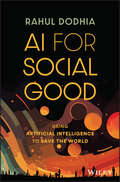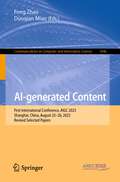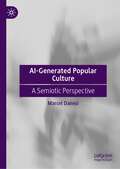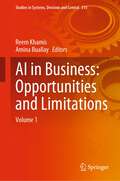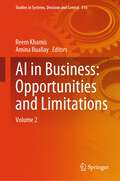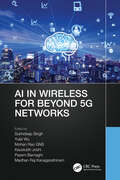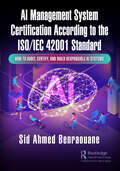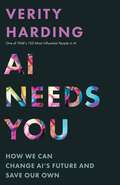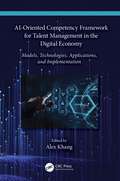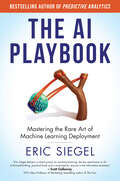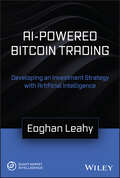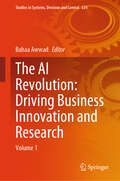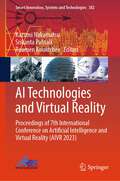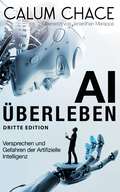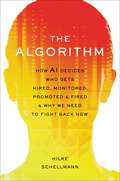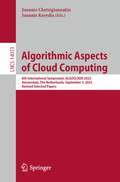- Table View
- List View
AI-Driven Cybersecurity and Threat Intelligence: Cyber Automation, Intelligent Decision-Making and Explainability
by Iqbal H. SarkerThis book explores the dynamics of how AI (Artificial Intelligence) technology intersects with cybersecurity challenges and threat intelligence as they evolve. Integrating AI into cybersecurity not only offers enhanced defense mechanisms, but this book introduces a paradigm shift illustrating how one conceptualize, detect and mitigate cyber threats. An in-depth exploration of AI-driven solutions is presented, including machine learning algorithms, data science modeling, generative AI modeling, threat intelligence frameworks and Explainable AI (XAI) models. As a roadmap or comprehensive guide to leveraging AI/XAI to defend digital ecosystems against evolving cyber threats, this book provides insights, modeling, real-world applications and research issues. Throughout this journey, the authors discover innovation, challenges, and opportunities. It provides a holistic perspective on the transformative role of AI in securing the digital world.Overall, the useof AI can transform the way one detects, responds and defends against threats, by enabling proactive threat detection, rapid response and adaptive defense mechanisms. AI-driven cybersecurity systems excel at analyzing vast datasets rapidly, identifying patterns that indicate malicious activities, detecting threats in real time as well as conducting predictive analytics for proactive solution. Moreover, AI enhances the ability to detect anomalies, predict potential threats, and respond swiftly, preventing risks from escalated. As cyber threats become increasingly diverse and relentless, incorporating AI/XAI into cybersecurity is not just a choice, but a necessity for improving resilience and staying ahead of ever-changing threats. This book targets advanced-level students in computer science as a secondary textbook. Researchers and industry professionals working in various areas, such as Cyber AI, Explainable and Responsible AI, Human-AI Collaboration, Automation and Intelligent Systems, Adaptive and Robust Security Systems, Cybersecurity Data Science and Data-Driven Decision Making will also find this book useful as reference book.
AI-Driven Project Management: Harnessing the Power of Artificial Intelligence and ChatGPT to Achieve Peak Productivity and Success
by Kristian BaineyAccelerate your next project with artificial intelligence and ChatGPT In AI-Driven Project Management: Harnessing the Power of Artificial Intelligence and ChatGPT to Achieve Peak Productivity and Success, veteran IT and project management advisor Kristian Bainey delivers an insightful collection of strategies for automating the administration and management of projects. In the book, the author focuses on four key areas where project leaders can achieve improved results with AI's data-centric capabilities: minimizing surprises, minimizing bias, increasing standards, and accelerating decision making. You'll also find: Primers on the role of AI and ChatGPT in Agile, Hybrid, and Predictive approaches to project management How to accurately forecast a project with ChatGPT Techniques for crafting impactful AI strategy using AI project management principles Perfect for managers, executives, and business leaders everywhere, AI-Driven Project Management is also a must-read for project management professionals, tech professionals and enthusiasts, and anyone else interested in the intersection of artificial intelligence, machine learning, and project management.
AI, Ethics, and Discrimination in Business: The DEI Implications of Algorithmic Decision-Making (Palgrave Studies in Equity, Diversity, Inclusion, and Indigenization in Business)
by Marco MarabelliThis book takes a historical approach to explore data, algorithms, their use in practice through applications of AI in various settings, and all of the surrounding ethical and DEI implications. Summarizing our current knowledge and highlighting gaps, it offers original examples from empirical research in various settings, such as healthcare, social media, and the GIG economy.The author investigates how systems relying on a binary structure (machines) work in systems that are instead analogic (societies). Further, he examines how underrepresented populations, who have been historically penalized by technologies, can play an active role in the design of automated systems, with a specific focus on the US legal and social system.One issue is that main tasks of machines concern classification, which, while efficient for speeding up decision-making processes, are inherently biased. Ultimately, this work advocates for ethical design and responsible implementation and deployment of technology in organizations and society through through government-sponsored social justice, in contrast with free market policies.This interdisciplinary text contributes to the timely and relevant debate on algorithmic fairness, biases, and potential discriminations. It will appeal to researchers in business ethics and information systems while building on theories from anthropology, psychology, sociology, management, marketing, and economics.
AI for Designers
by Md Haseen Akhtar Janakarajan RamkumarThis book presents select research writings from researchers and professionals around the globe on the application, potential, and limitations of AI in different domains. The topics covered include AI in product design, AI in architecture design, AI in textile design, AI in interaction design, and AI for society in general. The book also discusses various cross-applications of AI in other industrial sectors like urban planning and design, AI for inclusive future, etc. The book is a valuable reference for designers in multidisciplinary areas. This book is of interest for anyone who is a beginner, researcher, and professional interested in artificial intelligence and allied fields.
AI for Good: Applications in Sustainability, Humanitarian Action, and Health
by Juan M. Lavista Ferres William B. WeeksDiscover how AI leaders and researchers are using AI to transform the world for the better In AI for Good: Applications in Sustainability, Humanitarian Action, and Health, a team of veteran Microsoft AI researchers delivers an insightful and fascinating discussion of how one of the world’s most recognizable software companies is tacking intractable social problems with the power of artificial intelligence (AI). In the book, you’ll learn about how climate change, illness and disease, and challenges to fundamental human rights are all being fought using replicable methods and reusable AI code. The authors also provide: Easy-to-follow, non-technical explanations of what AI is and how it works Examinations of how healthcare is being improved, climate change is being addressed, and humanitarian aid is being facilitated around the world with AI Discussions of the future of AI in the realm of social benefit organizations and efforts An essential guide to impactful social change with artificial intelligence, AI for Good is a must-read resource for technical and non-technical professionals interested in AI’s social potential, as well as policymakers, regulators, NGO professionals, and, and non-profit volunteers.
AI for Humanity: Building a Sustainable AI for the Future
by Andeed Ma James Ong Siok Siok TanCapture the value of cutting-edge AI while mitigating its most salient risks AI For Humanity: Building a Sustainable AI for the Future delivers an incisive and timely discussion of how to design, build, and implement cutting-edge AI in for-profit firms and other organizations in a responsible, sustainable, and ethical way. The book walks you through the three pillars of human-focused AI development—governance, technology, and commercialization—and dives deep into each one, showing you how to create AI products and services that better humanity and advance universally held values. You'll find methodologies and frameworks that mitigate against some of the most profound and unsettling risks of unchecked artificial intelligence development, and roadmaps to help you avoid the numerous pitfalls and traps awaiting unsuspecting companies, managers, and executives. You'll also discover: Real-world case studies, from companies including SAP, Huawei, and Tencent, demonstrating the actual dilemmas and questions firms face when developing and implementing this extraordinary tech Actionable commitments you can make to help ensure you and your company avoid the ethical and reputational risks associated with AI Strategies for AI product and service development consistent with sustainable growth Perfect for managers, executives, directors, and other business leaders with a stake in responsible artificial intelligence design, development, and implementation, AI For Humanity will also interest regulators, academics, thought leaders, and policy makers doing their best to capture AI's substantial potential value while mitigating its most serious risks.
AI for Peace (AI for Everything)
by Branka Panic Paige ArthurThe role of artificial intelligence in war is widely recognized, but is there also a role for AI in fostering peace and preventing conflict? AI for Peace provides a new perspective on AI as a potential force for good in conflict-affected countries through its uses for early warning, combating hate speech, human rights investigations, and analyzing the effects of climate change on conflict. This book acts as an essential primer for introducing people working on peacebuilding and conflict prevention to the latest advancements in emerging AI technologies and will act as guide for ethical future practice. This book also aims to inspire data scientists to engage in the peacebuilding and prevention fields and to better understand the challenges of applying data science in conflict and fragile settings.
AI for Radiology (AI for Everything)
by Oge MarquesArtificial intelligence (AI) has revolutionized many areas of medicine and is increasingly being embraced. This book focuses on the integral role of AI in radiology, shedding light on how this technology can enhance patient care and streamline professional workflows. This book reviews, explains, and contextualizes some of the most current, practical, and relevant developments in artificial intelligence and deep learning in radiology and medical image analysis. AI for Radiology presents a balanced viewpoint of the impact of AI in these fields, underscoring that AI technologies are not intended to replace radiologists but rather to augment their capabilities, freeing professionals to focus on more complex cases. This book guides readers from the basic principles of AI to their practical applications in radiology, moving from the role of data in AI to the ethical and regulatory considerations of using AI in radiology and concluding with a selection of resources for further exploration. This book has been crafted with a diverse readership in mind. It is a valuable asset for medical professionals eager to stay up to date with AI developments, computer scientists curious about AI’s clinical applications, and anyone interested in the intersection of healthcare and technology.
AI for Social Good: Using Artificial Intelligence to Save the World
by Rahul DodhiaUnderstand the real power of AI and and its ability to shape the future for the better. AI For Social Good: Using Artificial Intelligence to Save the World bridges the gap between the current state of reality and the incredible potential of AI to change the world. From humanitarian and environmental concerns to advances in art and science, every area of life stands poised to make a quantum leap into the future. The problem? Too few of us really understand how AI works and how to integrate it into our policies and projects. In this book, Rahul Dodhia, Deputy Director of Microsoft’s AI for Good Research Lab, offers a nontechnical exploration of artificial intelligence tools—how they’re built, what they can and can’t do, and the raw material that teaches them what they “know.” Readers will also find an inventory of common challenges they might face when integrating AI into their work. You'll also read more on: The potential for AI to solve longstanding issues and improve lives Learn how you can tap into the power of AI, regardless of the size of your organization Gain an understanding of how AI works and how to communicate with AI scientists to create new solutions Understand the real risks of implementing AI and how to avoid potential pitfalls Real-life examples and stories that demonstrate how teams of AI specialists, project managers, and subject matter experts can achieve remarkable products. Written for anyone who is curious about AI, and especially useful for policymakers, project managers, and leaders who work alongside AI, AI For Social Good provides discussions of how AI scientists create artificially intelligent systems, and how AI can be used ethically (or unethically) to transform society. You’ll also find a discussion of how governments can become more flexible, helping regulations keep up with the fast pace of change in technology.
AI-generated Content: First International Conference, AIGC 2023, Shanghai, China, August 25–26, 2023, Revised Selected Papers (Communications in Computer and Information Science #1946)
by Feng Zhao Duoqian MiaoThis book constitutes the revised selected papers of the First International Conference, AIGC 2023, held in Shanghai, China, during August 25–26, 2023The 30 full papers included in this volume were carefully reviewed and selected from 62 submissions. The volume focuses on the remarkable strides that have been made in the realm of artificial intelligence and its transformative impact on content creation. As delving into the content of the proceedings, the readers will encounter cutting-edge research findings, innovative applications, and thought-provoking insights that underscore the transformative potential of AI-generated content.
AI-Generated Popular Culture: A Semiotic Perspective
by Marcel DanesiThis book gives a general overview of Artificial Intelligence as it is impacting on the world of the arts and culture. What is AI-generated pop culture? What does a movie, a musical work, a novel, or song created entirely by a generative AI imply in terms of our notions of creativity? What is the semiotic dynamic (the meaning-making impulse that humans imprint in sign and textual forms) that is involved in an AI-produced work? No comprehensive treatment exists of the profound implications that AI-generated pop culture entails, including how it might affect cultural evolution and how we interpret artistic artifacts. Such a treatment is critical at this moment, and this book aims to fill this gap.
AI in Business: Volume 1 (Studies in Systems, Decision and Control #515)
by Reem Khamis Amina BuallayThis book is a comprehensive guide to understanding the potential of artificial intelligence (AI) in improving business functions, as well as the limitations and challenges that come with its implementation. In this book, readers will learn about the various opportunities that AI presents in business, including how it can automate routine tasks, reduce errors, and increase efficiency. The book covers a range of topics, including how AI can be used in financial reporting, auditing, fraud detection, and tax preparation. However, the book also explores the limitations of AI in business, such as the need for skilled professionals, data quality, and the potential for bias. It examines the challenges that companies face when implementing AI in business functions, including the need for ethical considerations, transparency, and accountability. The book is written for business professionals, business leaders, and anyone interested in the potential of AI in business functions. It offers practical advice on how to implement AI effectively and provides insights into the latest developments in AI technology. Through case studies and real-world examples, readers will gain a deeper understanding of how AI can be used to enhance business functions, as well as the potential pitfalls and limitations to be aware of. Overall, "AI in Business: Opportunities and Limitations" is an essential guide for anyone looking to harness the power of AI to improve their business functions, and to stay ahead in an increasingly competitive business environment.
AI in Business: Volume 2 (Studies in Systems, Decision and Control #516)
by Reem Khamis Amina BuallayThis book is a comprehensive guide to understanding the potential of artificial intelligence (AI) in improving business functions, as well as the limitations and challenges that come with its implementation. In this book, readers will learn about the various opportunities that AI presents in business, including how it can automate routine tasks, reduce errors, and increase efficiency. The book covers a range of topics, including how AI can be used in financial reporting, auditing, fraud detection, and tax preparation. However, the book also explores the limitations of AI in business, such as the need for skilled professionals, data quality, and the potential for bias. It examines the challenges that companies face when implementing AI in business functions, including the need for ethical considerations, transparency, and accountability. The book is written for business professionals, business leaders, and anyone interested in the potential of AI in business functions. It offers practical advice on how to implement AI effectively and provides insights into the latest developments in AI technology. Through case studies and real-world examples, readers will gain a deeper understanding of how AI can be used to enhance business functions, as well as the potential pitfalls and limitations to be aware of. Overall, this book is an essential guide for anyone looking to harness the power of AI to improve their business functions and to stay ahead in an increasingly competitive business environment.
AI in Wireless for Beyond 5G Networks
by Sukhdeep Singh Yulei Wu Mohan Rao Gns Kaustubh Joshi Payam Barnaghi Madhan Raj KanagarathinamArtificial intelligence (AI) is a game changer in many domains, and wireless communication networks are no exception. With the advent of 5G networks, we have witnessed rapid growth in wireless connectivity, which has led to unprecedented opportunities for innovation and new use cases. However, as we move beyond 5G (B5G), the challenges and opportunities are set to become even more significant, offering new, previously unimaginable services. AI in Wireless for Beyond 5G Networks provides a comprehensive overview of the use of AI in wireless communication for B5G networks. The authors draw on their expertise in the field to explore the latest developments in AI technologies and their applications in B5G wireless communication systems. The book discusses a wide range of topics, including enabling AI technologies, architecture, and applications of AI from smartphones, radio access networks (RANs), edge and core networks, and application service providers. It also discusses the trends in on-device AI for B5G networks. This book is written in an accessible style, making it an ideal resource for academics, researchers, and industry professionals in wireless communication. It provides valuable insights into the latest field trends and developments and practical possibilities for implementing AI technologies in wireless communication systems. Above all, this book is a testament to the power of collaboration and innovation in wireless communication. The authors’ dedication and expertise have produced a valuable resource for anyone interested in the latest AI and wireless communication developments. This book will inspire and inform readers, and we highly recommend it to scholars interested in the future of AI in wireless communication.
AI Investing For Dummies
by Paul MladjenovicWinning strategies for investors looking to boost gains with artificial intelligence AI is one of the hottest investment trends on Wall Street. AI Investing For Dummies gives you all the must-know details on how artificial intelligence can benefit investors. You’ll learn how powerful AI can be in helping you make better decisions, identify hidden opportunities, and build wealth in stocks, bonds, commodities, and real estate. This easy-to-understand Dummies guide also covers budgeting, taxes, estates, and planning for college and retirement—all with AI-specific tactics that can improve efficiency, mitigate risk, and level up your portfolio’s performance. You’ll also find all the info you need to sift through and implement the right resources and solutions for you. Understand the benefits and drawbacks of AI investing Debunk the biggest myths about AI investing Get an in-depth analysis of the top AI stocks to watch Learn how to avoid common pitfalls in AI investing Take a peek at the role of AI in shaping the future of finance This is the ideal Dummies resource for consumers and investors who are new to AI and want to wrap their heads around this emerging technology.
AI Management System Certification According to the ISO/IEC 42001 Standard: How to Audit, Certify, and Build Responsible AI Systems
by Sid Ahmed BenraouaneThe book guides the reader through the auditing and compliance process of the newly released ISO Artificial Intelligence standard. It provides tools and best practices on how to put together an AI management system that is certifiable and sheds light on ethical and legal challenges business leaders struggle with to make their AI system comply with existing laws and regulations, and the ethical framework of the organization.The book is unique because it provides implementation guidance on the new certification and conformity assessment process required by the new ISO Standard on Artificial Intelligence (ISO 42001:2023 Artificial Intelligence Management System) published by ISO in August 2023. This is the first book that addresses this issue.As a member of the US/ISO team who participated in the drafting of this standard during the last 3 years, the author has direct knowledge and insights that are critical to the implementation of the standard. He explains the context of how to interpret ISO clauses, gives examples and guidelines, and provides best practices that help compliance managers and senior leadership understand how to put together the AI compliance system to certify their AI system. The reader will find in the book a complete guide to the certification process of AI systems and the conformity assessment required by the standard. It also provides guidance on how to read the new EU AI Act and some of the U.S. legislations, such as NYC Local Law 144, enacted in July 2023.This is the first book that helps the reader create an internal auditing program that enhances the company’s AI compliance framework. Generative AI has taken the world by storm, and currently, there is no international standard that provides guidance on how to put together a management system that helps business leaders address issues of AI governance, AI structure, AI risk, AI audit, and AI impact analysis. ISO/IEC 42001:2023 is the first international mandatory and certifiable standard that provides a comprehensive and well-integrated framework for the issue of AI governance. This book provides a step-by-step process on how to implement the standard so the AI system can pass the ISO accreditation process.
AI Needs You: How We Can Change AI's Future and Save Our Own
by Verity HardingA humanist manifesto for the age of AIArtificial intelligence may be the most transformative technology of our time. As AI&’s power grows, so does the need to figure out what—and who—this technology is really for. AI Needs You argues that it is critical for society to take the lead in answering this urgent question and ensuring that AI fulfills its promise.Verity Harding draws inspiring lessons from the histories of three twentieth-century tech revolutions—the space race, in vitro fertilization, and the internet—to empower each of us to join the conversation about AI and its possible futures. Sharing her perspective as a leading insider in technology and politics, she rejects the dominant narrative, which often likens AI&’s advent to that of the atomic bomb. History points the way to an achievable future in which democratically determined values guide AI to be peaceful in its intent; to embrace limitations; to serve purpose, not profit; and to be firmly rooted in societal trust.AI Needs You gives us hope that we, the people, can imbue AI with a deep intentionality that reflects our best values, ideals, and interests, and that serves the public good. AI will permeate our lives in unforeseeable ways, but it is clear that the shape of AI&’s future—and of our own—cannot be left only to those building it. It is up to us to guide this technology away from our worst fears and toward a future that we can trust and believe in.
AI-Oriented Competency Framework for Talent Management in the Digital Economy: Models, Technologies, Applications, and Implementation
by Alex KhangIn the digital-driven economy era, an AI-oriented competency framework (AIoCF) is a collection to identify AI-oriented knowledge, attributes, efforts, skills, and experiences (AKASE) that directly and positively affect the success of employees and the organization. The application of skills-based competency analytics and AI-equipped systems is gradually becoming accepted by business and production organizations as an effective tool for automating several managerial activities consistently and efficiently in developing and moving the capacity of a company up to a world-class level.AI-Oriented Competency Framework for Talent Management in the Digital Economy: Models, Technologies, Applications, and Implementation discusses all the points of an AIoCF, which includes predictive analytics, advisory services, predictive maintenance, and automated processes, which help to make the operations of project management, personnel management, or administration more efficient, profitable, and safe. The book includes the functionality of emerging career pathways, hybrid learning models, and learning paths related to the learning and development of employees in the production or delivery fields. It also presents the relationship between skills taxonomy and competency framework with interactive methods using datasets, processing workflow diagrams, and architectural diagrams for easy understanding of the application of intelligent functions in role-based competency systems. By also covering upcoming areas of AI and data science in many government and private organizations, the book not only focuses on managing big data and cloud resources of the talent management system but also provides cybersecurity techniques to ensure that systems and employee competency data are secure.This book targets a mixed audience of students, engineers, scholars, researchers, academics, and professionals who are learning, researching, and working in the field of workforce training, human resources, talent management systems, requirement, headhunting, outsourcing, and manpower consultant services from different cultures and industries in the era of digital economy.
The AI Playbook: Mastering the Rare Art of Machine Learning Deployment (Management on the Cutting Edge)
by Eric SiegelIn his bestselling first book, Eric Siegel explained how machine learning works. Now, in The AI Playbook, he shows how to capitalize on it.&“Eric Siegel delivers a robust primer on machine learning, the key mechanism in AI. A forward-looking, practical book and a must-read for anyone in the information economy.&” —Scott Galloway, NYU Stern Professor of Marketing; bestselling author of The Four &“An antidote to today&’s relentless AI hype—why some AI initiatives thrive while others fail and what it takes for companies and people to succeed.&”—Charles Duhigg, author of bestsellers The Power of Habit and Smarter Faster BetterThe greatest tool is the hardest to use. Machine learning is the world&’s most important general-purpose technology—but it&’s notoriously difficult to launch. Outside Big Tech and a handful of other leading companies, machine learning initiatives routinely fail to deploy, never realizing value. What&’s missing? A specialized business practice suitable for wide adoption. In The AI Playbook, bestselling author Eric Siegel presents the gold-standard, six-step practice for ushering machine learning projects from conception to deployment. He illustrates the practice with stories of success and of failure, including revealing case studies from UPS, FICO, and prominent dot-coms. This disciplined approach serves both sides: It empowers business professionals, and it establishes a sorely needed strategic framework for data professionals. Beyond detailing the practice, this book also upskills business professionals—painlessly. It delivers a vital yet friendly dose of semi-technical background knowledge that all stakeholders need to lead or participate in machine learning projects, end to end. This puts business and data professionals on the same page so that they can collaborate deeply, jointly establishing precisely what machine learning is called upon to predict, how well it predicts, and how its predictions are acted upon to improve operations. These essentials make or break each initiative—getting them right paves the way for machine learning&’s value-driven deployment.What kind of AI does this book cover? The buzzword AI can mean many things, but this book is about machine learning, which is a central basis for—and what many mean by—AI. To be specific, this book covers the most vital use cases of machine learning, those designed to improve a wide range of business operations.
AI-Powered Bitcoin Trading: Developing an Investment Strategy with Artificial Intelligence
by Eoghan LeahySurvive and thrive amongst the professional traders using sophisticated cryptocurrency analysis and trading techniques The purpose of this book is to provide a concise yet comprehensive background of some effective methods for analyzing markets and creating fully automated AI-optimized trading systems. The book outlines some easy-to-replicate yet highly effective quant trading techniques that can be used for analyzing asset prices and then apply them to Bitcoin prices, showing how to generate actionable insights from data that can be used to create fully automated trading signals and systems. Big data analytics can be enhanced with artificial intelligence techniques. Back testing and optimization methods are presented with a special emphasis placed on the use of distributed genetic algorithms for parameter optimization. Finally, a case study of a fully automated trend-following trading strategy that leverages artificial intelligence is presented. Bitcoin AlphaBot™ combines human insight with AI-driven optimization to build profit table trend trading strategies.
The AI Revolution: Volume 1 (Studies in Systems, Decision and Control #524)
by Bahaa AwwadThis comprehensive book explores the transformative role of artificial intelligence (AI) in business innovation and research. It provides a solid foundation in AI technologies, such as machine learning, natural language processing, and computer vision, and examines how they reshape business models and revolutionize industries. The book highlights the strategic implications of AI in enhancing customer experience, optimizing operations, and enabling data-driven decision-making. It explores the integration of AI with emerging trends like IoT, blockchain, and cloud computing for innovation. The role of AI in advancing scientific discovery and academic research is also explored, addressing challenges and opportunities in AI-driven methodologies. Organizational and ethical dimensions of AI implementation are considered, including talent acquisition, skills development, and data governance. Real-world case studies showcase AI's transformative power across diverse industries. This forward-thinking guide equips academics, researchers, and business leaders with knowledge and insights to harness the potential of AI and contribute to innovation and research.
AI Technologies and Virtual Reality: Proceedings of 7th International Conference on Artificial Intelligence and Virtual Reality (AIVR 2023) (Smart Innovation, Systems and Technologies #382)
by Kazumi Nakamatsu Srikanta Patnaik Roumen KountchevThis book gathers a collection of selected works and new research results of scholars and graduate students presented at the 7th International Conference on Artificial Intelligence and Virtual Reality (AIVR 2023) held in Kumamoto, Japan during July 21-23, 2023. The focus of the book is interdisciplinary in nature and includes research on all aspects of artificial intelligence and virtual reality, from fundamental development to the applied system. The book covers topics such as system techniques, performance, and implementation; content creation and modelling; cognitive aspects, perception, user behaviour; AI technologies; interactions, interactive and responsive environments; AI/VR applications and case studies.
AI überleben: Das Versprechen und die Gefahr Artifizielle Intelligenz
by Janardhan MarappaDies ist das Jahrhundert zweier Singularitäten – der wirtschaftlichen Singularität (technologische Arbeitslosigkeit) und der technologischen Singularität (Intelligenzexplosion). Beides birgt enorme Chancen und enorme Herausforderungen. Wenn wir sie erfolgreich verwalten, ist unsere Zukunft als Spezies mehr als wunderbar. Wenn wir versagen, könnte es miserabel sein - und vielleicht kurz. Der Treiber ist Artifizelle Intelligenz (AI) - die leistungsstärkste Technologie der Menschheit. Software, die Probleme löst und Daten in Erkenntnisse umwandelt, hat unser Leben bereits revolutioniert, und die Revolution beschleunigt sich. Das Argument dieses Buches ist, dass wir die stattfindenden Veränderungen überwachen und Richtlinien verabschieden sollten, die die bestmöglichen Ergebnisse fördern. Die Bandbreite der möglichen Ergebnisse ist groß, vom Schrecklichen bis zum Wunderbaren, und sie sind nicht vorherbestimmt. Sie werden zum Teil durch Glück, zum Teil durch ihre eigene interne Logik, zum Teil aber auch durch die Politik auf allen Ebenen der Gesellschaft ausgewählt. Automatisierung und Superintelligenz sind die beiden Entwicklungen, von denen wir bereits sehen, dass sie wahrscheinlich enorme Auswirkungen haben werden. Automatisierung könnte zu einer wirtschaftlichen Singularität und der Entwicklung einer völlig anderen Art von Wirtschaft führen. Wenn wir das falsch verstehen, könnte eine Elite die Produktionsmittel besitzen und den Rest von uns in einem dystopischen technologischen autoritären Regime unterdrücken. Wenn wir es richtig machen, könnten wir eine Wirtschaft des radikalen Überflusses genießen, in der niemand arbeiten muss, um seinen Lebensunterhalt zu verdienen, und wir alle frei sind, Spaß zu haben, unseren Geist zu dehnen und unsere Fähigkeiten voll zu entfalten. Die Ankunft der Superintelligenz wird, falls und wenn sie eintritt, eine technologische Singularität darstellen, die das bedeutendste Ere
The Algorithm: How AI Decides Who Gets Hired, Monitored, Promoted, and Fired and Why We Need to Fight Back Now
by Hilke SchellmannBased on exclusive information from whistleblowers, internal documents, and real world test results, Emmy‑award winning Wall Street Journal contributor Hilke Schellmann delivers a shocking and illuminating expose on the next civil rights issue of our time: how AI has already taken over the workplace and shapes our future. Hilke Schellmann, is an Emmy‑award winning investigative reporter, Wall Street Journal and Guardian contributor and Journalism Professor at NYU. In The Algorithm, she investigates the rise of artificial intelligence (AI) in the world of work. AI is now being used to decide who has access to an education, who gets hired, who gets fired, and who receives a promotion. Drawing on exclusive information from whistleblowers, internal documents and real‑world tests, Schellmann discovers that many of the algorithms making high‑stakes decisions are biased, racist, and do more harm than good. Algorithms are on the brink of dominating our lives and threaten our human future—if we don't fight back. Schellmann takes readers on a journalistic detective story testing algorithms that have secretly analyzed job candidates' facial expressions and tone of voice. She investigates algorithms that scan our online activity including Twitter and LinkedIn to construct personality profiles à la Cambridge Analytica. Her reporting reveals how employers track the location of their employees, the keystrokes they make, access everything on their screens and, during meetings, analyze group discussions to diagnose problems in a team. Even universities are now using predictive analytics for admission offers and financial aid.
Algorithmic Aspects of Cloud Computing: 8th International Symposium, ALGOCLOUD 2023, Amsterdam, The Netherlands, September 5, 2023, Revised Selected Papers (Lecture Notes in Computer Science #14053)
by Ioannis Chatzigiannakis Ioannis KarydisThis book constitutes revised selected papers from the 8th International Symposium on Algorithmic Aspects of Cloud Computing, ALGOCLOUD 2023, held in Amsterdam, The Netherlands, on September 5, 2023. The 13 full papers included in this book were carefully reviewed and selected from 24 submissions. They focus on algorithmic aspects of computing and data management in modern cloud-based systems interpreted broadly so as to include edge- and fog-based systems, cloudlets, cloud micro-services, virtualization environments, decentralized systems, as well as dynamic networks.
